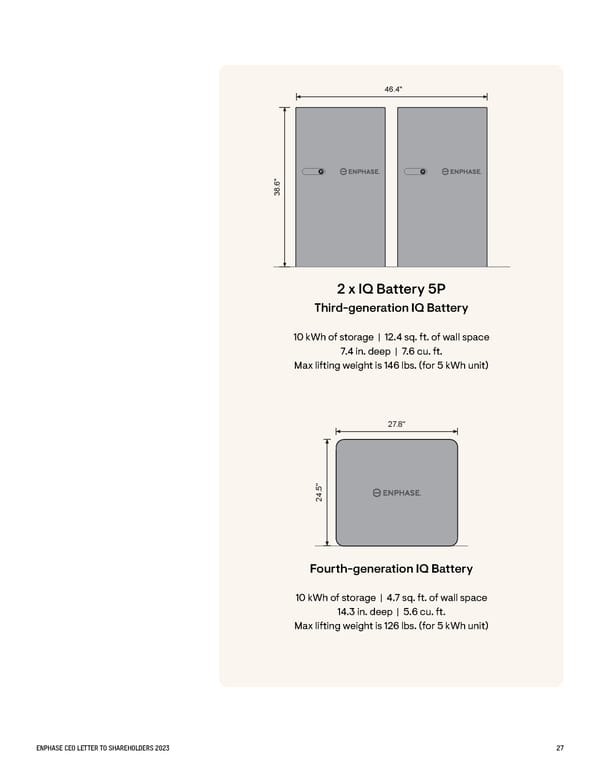Beyond the IQ8 family of microinverters, we are working on the IQ9™ Microinverter family, which we expect to introduce to the market in 2025. 46.4" The IQ9 family will support even higher DC input currents up to 18 amperes, as well as higher AC grid voltages including 480 V for the small commercial market. The IQ9 microinverters will use Gallium Nitride (GaN) high-voltage transistors to enable higher output power and lower cost. We are working closely with our GaN suppliers to maximize the bene ts of this wide bandgap (WBG) technology for our application. We will also use a proprietary novel " isolated driver technology and multiple innovations in magnetics, mechanical, 6 . 8 and thermal design to deliver higher power at a lower cost. 3 After IQ9, we plan to introduce the IQ10™ family of microinverters that will be built around a new ASIC chipset we believe will raise the bar for functional safety and security in the solar industry, including many features found today in automotive products. This new ASIC utilizes an advanced 22 nm CMOS process that enables a higher level of integration and performance without 2 x IQ Battery 5P adding cost or power loss. IQ10 Microinverters will further reduce the cost and size by operating at 4x the switching frequency of IQ9 Microinverters, allowing Third-generation IQ Battery us to maximize the bene ts of GaN and use novel magnetics technologies. IQ10 is designed to support native 3-phase generation as well as neutral-10 kWh of storage | 12.4 sq. ft. of wall space forming. IQ10 technology will be used to power our next generation of solar 7.4 in. deep | 7.6 cu. ft. inverters, batteries, and bi-directional EV chargers. Max lifting weight is 146 lbs. (for 5 kWh unit) “In 2025, we plan to introduce our We started shipping batteries to North America in 2020. Since then, we fourth-generation battery, which have received a lot of feedback from our installers asking for higher power is designed to increase energy and robust communication. In 2023, we introduced IQ Battery 5P, our third-27.8" density by 40%, reduce wall space generation battery, which delivers higher continuous power and peak power area by 60%, and reduce cost.”at the same cost. This means homeowners are now able to start heavy loads such as air conditioners and pool pumps with ease. The higher charging and discharging rate of the third-generation battery is also uniquely bene cial " 5 to NEM 3.0 systems in California through its ability to generate revenue . 4 2 by exporting into the grid at the appropriate time. The battery uses a wired Controller Area Network (CAN) for increased robustness. In 2025, we plan to introduce our fourth-generation battery, which is designed to increase energy density by 40%, reduce wall space area by 60%, and Fourth-generation IQ Battery reduce cost. This is achieved primarily by optimizing the electronics inside the battery, utilizing our new 1.68 kW AC microinverter variant with integrated 10 kWh of storage | 4.7 sq. ft. of wall space battery management and neutral-forming capability. We are also working 14.3 in. deep | 5.6 cu. ft. closely with our battery cell suppliers to advance our battery design life up Max lifting weight is 126 lbs. (for 5 kWh unit) to 20 years, and to further improve battery safety and reliability. Starting in 2024, our batteries will include microinverters manufactured in our contract manufacturing facilities in the United States, leveraging the IRA. 26 ENPHASE CEO LETTER TO SHAREHOLDERS 2023 27
 CEO Letter to Shareholders Page 26 Page 28
CEO Letter to Shareholders Page 26 Page 28